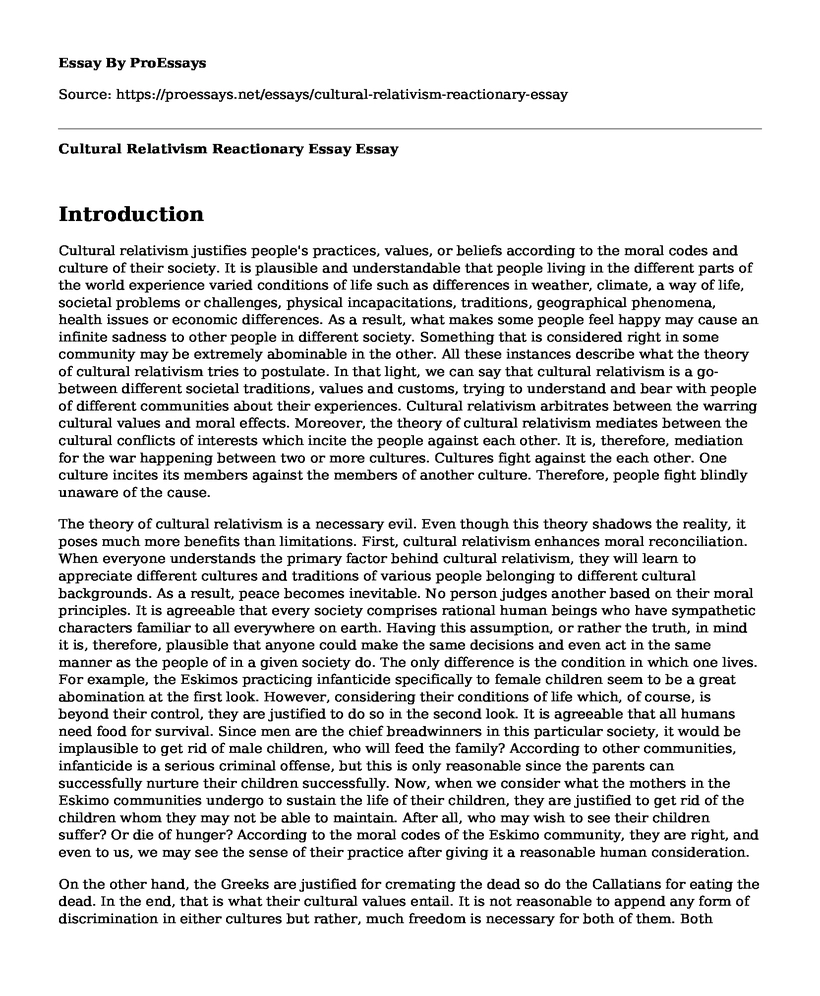Introduction
Cultural relativism justifies people's practices, values, or beliefs according to the moral codes and culture of their society. It is plausible and understandable that people living in the different parts of the world experience varied conditions of life such as differences in weather, climate, a way of life, societal problems or challenges, physical incapacitations, traditions, geographical phenomena, health issues or economic differences. As a result, what makes some people feel happy may cause an infinite sadness to other people in different society. Something that is considered right in some community may be extremely abominable in the other. All these instances describe what the theory of cultural relativism tries to postulate. In that light, we can say that cultural relativism is a go-between different societal traditions, values and customs, trying to understand and bear with people of different communities about their experiences. Cultural relativism arbitrates between the warring cultural values and moral effects. Moreover, the theory of cultural relativism mediates between the cultural conflicts of interests which incite the people against each other. It is, therefore, mediation for the war happening between two or more cultures. Cultures fight against the each other. One culture incites its members against the members of another culture. Therefore, people fight blindly unaware of the cause.
The theory of cultural relativism is a necessary evil. Even though this theory shadows the reality, it poses much more benefits than limitations. First, cultural relativism enhances moral reconciliation. When everyone understands the primary factor behind cultural relativism, they will learn to appreciate different cultures and traditions of various people belonging to different cultural backgrounds. As a result, peace becomes inevitable. No person judges another based on their moral principles. It is agreeable that every society comprises rational human beings who have sympathetic characters familiar to all everywhere on earth. Having this assumption, or rather the truth, in mind it is, therefore, plausible that anyone could make the same decisions and even act in the same manner as the people of in a given society do. The only difference is the condition in which one lives. For example, the Eskimos practicing infanticide specifically to female children seem to be a great abomination at the first look. However, considering their conditions of life which, of course, is beyond their control, they are justified to do so in the second look. It is agreeable that all humans need food for survival. Since men are the chief breadwinners in this particular society, it would be implausible to get rid of male children, who will feed the family? According to other communities, infanticide is a serious criminal offense, but this is only reasonable since the parents can successfully nurture their children successfully. Now, when we consider what the mothers in the Eskimo communities undergo to sustain the life of their children, they are justified to get rid of the children whom they may not be able to maintain. After all, who may wish to see their children suffer? Or die of hunger? According to the moral codes of the Eskimo community, they are right, and even to us, we may see the sense of their practice after giving it a reasonable human consideration.
On the other hand, the Greeks are justified for cremating the dead so do the Callatians for eating the dead. In the end, that is what their cultural values entail. It is not reasonable to append any form of discrimination in either cultures but rather, much freedom is necessary for both of them. Both practices are sensible, agreeable and correct based on the cultural values and moral codes of conduct.
Conclusion
In conclusion, cultural relativism appreciates the cultures of various communities. The theory brings understanding, cohesion, and reconciliation between the conflicting cultures. By understanding this theory, people will learn to appreciate each other's ways of life hence, promote peace in the whole society.
Cite this page
Cultural Relativism Reactionary Essay. (2022, Jul 11). Retrieved from https://proessays.net/essays/cultural-relativism-reactionary-essay
If you are the original author of this essay and no longer wish to have it published on the ProEssays website, please click below to request its removal:
- Adversarial Relationships: How to Create Better Relationships
- Critical Analysis of Health Disparities by Race and Class: Why Both Matter
- Essay Sample on Discourse Community and a Writing Community
- Urban Green Spaces (UGS) and Cultural Identity
- Essay Sample on 7 Elements of Negotiation: Improve Your Skills Now!
- Black Power Movement: Actors, Political Orgs and Events - Essay Sample
- Essay Sample on Social Media: Connecting Digital Worlds and Cheating Lives







